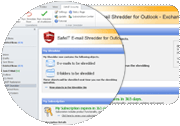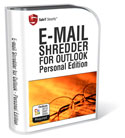Product information
E-mail Shredder for Outlook
- Personal Edition
SafeIT E-mail Shredder for Outlook is a software application for permanently removing (shredding) old and deleted e-mails from your Outlook Personal Storage (.PST) file.
(Click here for Exchange Edition)
Selected e-mails will be shredded along with all the unused space in your PST-file. This includes discarded e-mails, fragments of previously deleted e-mails and old attachments.
The only way to get rid of old e-mail data left behind, easy to recreate with recovery software, is to run a shredder. The product is completely integrated in Microsoft Office and will enhance the way you work with your information in Microsoft Outlook.
 Download 30 day demo
Download 30 day demo
 Get quote for organizational licensing >>
Get quote for organizational licensing >>
- One year subscription that
includes support and full
upgrades.

Read more>>
Main Features

- Quickly and easily select an e-mail to be shredded by moving it into the shredder folder added by the program.
- Keep track of how much you use the software with easy to read statistics of how much data that has been shredded.
- Shred both selected e-mails all the unused space of your PST-file (includes discarded e-mails, fragments of previously deleted e-mails and old attachments).
- Schedule shreddings to make sure your daily communication is kept secure with nothing left behind that you want to have erased.
- Completely integrated in Microsoft Outlook, easy to install and use.
- Vastly improving the security of your PST-file.
Deleted E-mails are NOT removed, only hidden
When you use Microsoft Outlook your e-mails are automatically and consistently duplicated, left behind and hidden away. An e-mail can exist up to eight times in your PST-file and traces of old discarded e-mails can exist from the time you first created your Outlook file.
In Microsoft Outlook; when you delete an e-mail, empty the “Deleted Items” folder, or even compress the PST-file, the information is NOT removed from your computer. These commands only alter the structure of the PST-file, leaving most of the data intact and recoverable with software tools easily available. This means that someone else can recreate old e-mails that you thought you have already deleted.
How is an e-mail shredded?
E-mails are shredded by overwriting its content a number of times with pre-defined data patterns. This will make recovery impossible, even with advanced software and hardware analysis tools. SafeIT E-mail Shredder currently supports 11 different algorithms ranging from 1 run up to 35 runs. Use the algorithm that your company's policy dictates or the one you are most comfortable with.
Because Microsoft Outlook creates multiple duplicates of a single e-mail simply shredding the selected e-mail is not enough. Therefore, when you select a single e-mail, all the unused space of your PST-file will be shredded. This is done to ensure that every trace of the e-mail is permanently removed - even the small fragments that are commonly scattered all through the PST-file.
Things you didn’t know about security in Microsoft Outlook!
An e-mail can exist up to eight different times in your PST-file. (Even more if you move it between folders.)
Whenever an e-mail is moved into the Deleted Items-folder, it will actually get copied to a new location in the PST-file, rather than deleted. (Contributing to the problem mentioned above.)
Commonly between 20-50 % of a typical PST-file is unused space (potentially containing sensitive information).
Password protection of a PST file is very easy to circumvent and remove. Simply replace the current password with a password of your choice.
The option “Compressible encryption” when creating a PST-file is the simplest form of encryption and only transposes the data (Ceasar cipher style). This is very easy to remove.
The option “High encryption” when creating a PST-file only improves security slightly but contains several weaknesses that makes it vulnerable to attack. It is, for example, still possible to change the password (see above) of the file and access the information that way.
The SafeIT Shredding Technology is based on well known standards and approved algorithms for complete data removal. The program has support for the following overwriting algorithm:
- HMG Infosec Standard 5, The Baseline Standard
- HMG Infosec Standard 5, The Enhanced Standard
- Peter Gutmann's algorithm
- U.S.Department of Defense Sanitizing (DOD 5220.22-M)
- Bruce Schneier's algorithm
- Navy Staff Office Publication (NAVSO P-5239-26) for RLL
- The National Computer Security Center(NCSC-TG-025)
- Air Force System Security Instruction 5020 (AFSSI-5020)
- US Army AR380-19
- German Standard VSITR
- OPNAVINST 5239.1A
- National Security Agency (NSA/CSS Manual 130-1) – for magnetic storage only.
- U.S.Department of Defense Sanitizing (DoD 5220.22-M ECE)
System requirements Languages

- Microsoft Windows 8, 7, Vista, XP or Windows 2000.
- Microsoft Office Outlook 2013, 2010, 2007 and 2003.
- Outlook Personal Storage file using the PST2003 format.
- English
- German
- Swedish
- French
- Chinese





